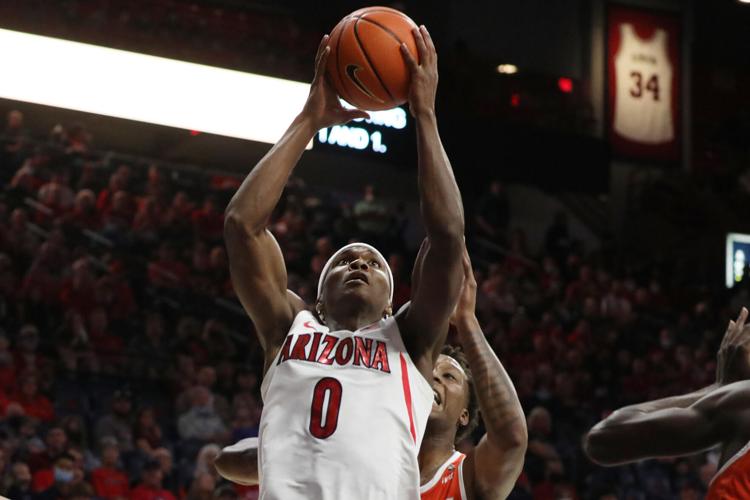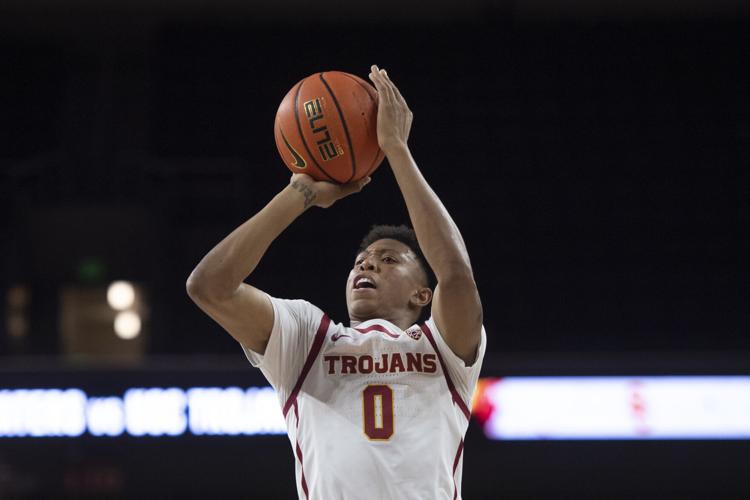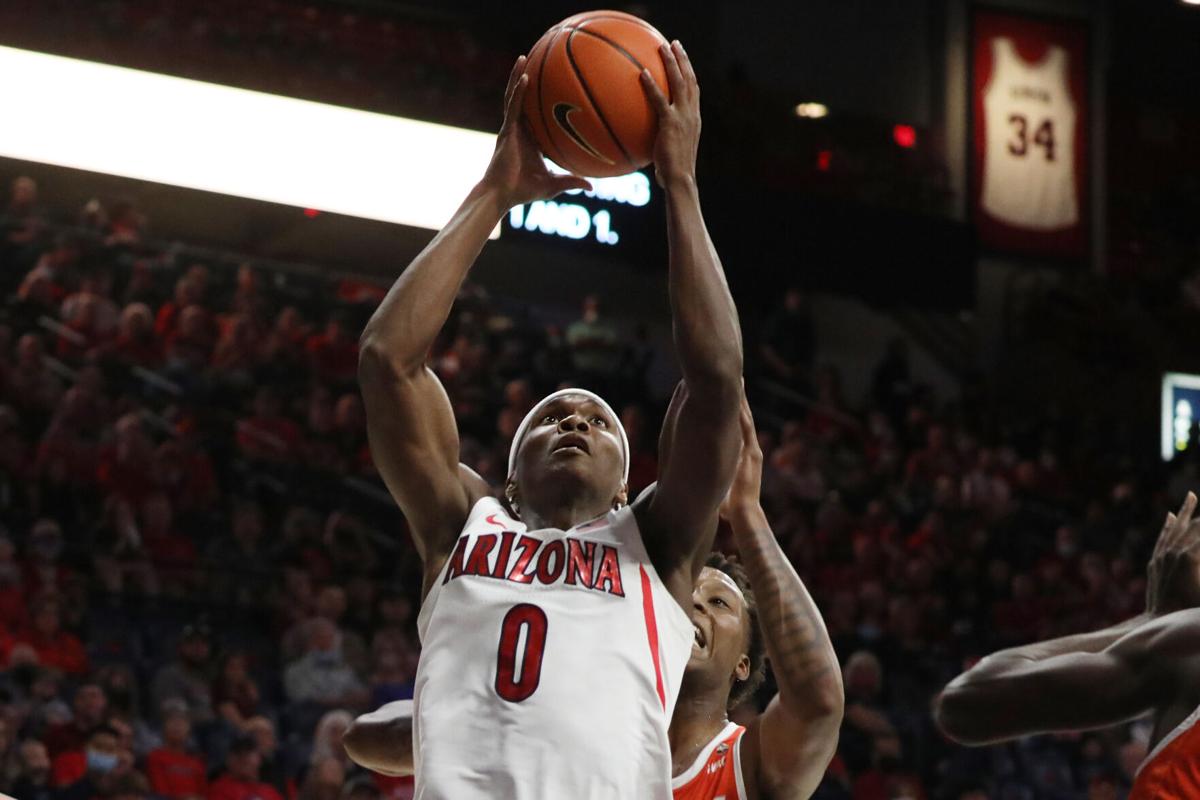Conference play is scheduled to begin in earnest this week for men’s basketball in the Pac-12, but questions linger like it’s the winter of 2020-21:
How many teams will play all 20 league games?
Which programs will avoid a lengthy COVID pause?
How many games will be canceled outright?
(There will be no forfeits. The Pac-12 announced last week that any games lost to COVID will be declared no contests.)
This much we know: Somehow, someway, there will be a conference season.
Our projections for the men’s race are below.
Notes:
The NET numbers refer to the NCAA Evaluation Tool, which frames the selection and seeding process for March Madness. The number of Quadrant I wins (the highest caliber) is a critical factor.
The Pomeroy rankings for offense and defense refer to each team’s standing nationally in Ken Pomeroy’s highly-influential efficiency metrics.
The predictions for best- and worst-case finishes are based on algorithms used by the Hotline.
Just kidding. We took a guess.
1. UCLA (8-1, 1-0)
NET numbers (overall/Quad I record): No. 21/2-1; Pomeroy rankings (offense/defense): No. 13/No. 18; Best case: first place; Worst case: third place
Comment: The Bruins have missed so much time due to COVID that rust is inevitable. But given the experience level within the core rotation and their familiarity with coach Mick Cronin’s system, it shouldn’t take long for them to ramp back to pre-pause form. One potentially bright side: Because UCLA’s exposures to the virus came largely during non-conference play, the league season could be relatively free of disruption once the Bruins are back on the floor.
2. Arizona (11-1, 1-0)
NET numbers (overall/Quad I record): No. 2/2-1; Pomeroy rankings (offense/defense): No. 14/No. 8; Best case: first place; Worst case: third place
Comment: Coach Tommy Lloyd’s system has meshed perfectly with the inherited talent. Arizona possesses size, depth and multiple high-end playmakers in Bennedict Mathurin and Azuolas Tubelis. We’re not completely sold on the 3-point shooting, but there’s enough to get through conference play and the first weekend of the NCAAs. Key question: Will the Wildcats experience a COVID shutdown? If so, when? And what impact will it have on momentum?
3. USC (12-0, 2-0)
NET numbers (overall/Quad I record): No. 13/1-0; Pomeroy rankings (offense/defense): 26/15; Best case: second place; Worst case: fourth place
Comment: The Trojans are one of five undefeated teams remaining in Division I, a testament to their balanced scoring and stout defense. Memphis transfer Boogie Ellis has been as good as advertised, while Isaiah Mobley and Chevez Goodwin form perhaps the best frontline in the conference. Our slight skepticism in the ultimate result is rooted in the Trojans’ soft non-conference schedule (No. 248 in the Pomeroy rankings).

Southern California guard Boogie Ellis (0) shoots during an NCAA college basketball game against UC Irvine Wednesday, Dec. 15, 2021, in Los Angeles.
4. Oregon (7-6, 0-2)
NET numbers (overall/Quad I record): No. 98/0-4; Pomeroy rankings (offense/defense): No. 34/No. 112; Best case: third place; Worst case: seventh place
Comment: After witnessing several or the worst performances of the Dana Altman era, we spotted clear progress from the Ducks just prior to the holiday break. That trajectory should continue as transfers Jacob Young, De’Vion Harmon and Quincy Guerrier become more comfortable and returnee N’Faly Dante gains experience. Oregon has five games scheduled against UCLA, USC and Arizona. We expect the Ducks to win at least two.
5. Colorado (9-3, 1-1)
NET numbers (overall/Quad I record): No. 111/0-2; Pomeroy rankings (offense/defense): No. 91/No. 76; Best case: third place; Worst case: seventh place
Comment: The Buffaloes have one of the Pac-12’s top coaches (Tad Boyle), best players (Jabari Walker) and most impressive freshman classes, plus the premier wing defender (Elijah Parquet). But is there enough of everything to produce a contender? Two issues give us pause: A bevy of close calls against second-rate opponents and double-digit losses to the best teams on the early-season schedule (UCLA and Tennessee).
6. Washington State (8-5, 1-1)
NET numbers (overall/Quad I record): No. 64/0-1; Pomeroy rankings (offense/defense): No. 84/No. 41; Best case: fourth place; Worst case: eighth place
Comment: A sizzling start to Year Two under Kyle Smith gave way to an unseemly stretch in which the Cougars lost five out of eight — this, despite a stream of second-rate opponents. WSU should avoid the bottom tier within the conference, but its success hinges on increased consistency from behind the 3-point line … or decreased reliance on the 3-point line. If the combination of high volume and low efficiency continues, so will the losses.
7. Stanford (8-4, 1-1)
NET numbers (overall/Quad I record): No. 103/1-2; Pomeroy rankings (offense/defense): No. 94/No. 82; Best case: fifth place; Worst case: 10th place
Comment: The most fitting outcome to Stanford’s season would be a tie for seventh place, with one A-level win, one F-level loss and little hope for an NCAA at-large berth. Because after six seasons under Jerod Haase, they have been the epitome of mediocrity — his conference record is 44-49 — and we don’t expect a significant change in course. There are several talented pieces but not enough of anything to suggest a breakthrough looms.
8. Utah (8-4, 1-1)
NET numbers (overall/Quad I record): No. 75/0-2; Pomeroy rankings (offense/defense): No. 62/No. 101; Best case: sixth place; Worst case: ninth place
Comment: Utah’s dynamics under first-year coach Craig Smith are shared by so many Pac-12 peers: a heavy reliance on newcomers; a soft non-conference schedule that limits clarity; the ability to beat anyone at home and lose to anyone on the road. We could have pegged the Utes for any number of landing spots and settled on eighth place because of skepticism about their defense (compared to other teams in the muddled middle).
9. Arizona State (5-7, 1-1)
NET numbers (overall/Quad I record): No. 124/1-3; Pomeroy rankings (offense/defense): No. 174/No. 48; Best case: sixth place; Worst case: 10th place
Comment: Perhaps no team in the conference possesses a wider range of potential outcomes than ASU, which has beaten Oregon and Creighton on the road but lost to San Francisco and UC Riverside at home. The inconsistency isn’t a complete surprise given the roster turnover, but we didn’t expect the lows to be quite so low. Scoring will be an issue for the Sun Devils given the erratic perimeter shooting and injury-related absence of forward Marcus Bagley.
10. Cal (8-5, 1-1)
NET numbers (overall/Quad I record): No. 119/0-2; Pomeroy rankings (offense/defense): No. 173/No. 60; Best case: eighth place; Worst case: 11th place
Comment: That the Bears have a reasonable chance to finish above 10th place speaks to the improvement of big man Andre Kelly, the impact of transfer guard Jordan Shepherd and the wobbly state of the league’s bottom tier. As was the case in prior seasons under Mark Fox, the Bears play as close to their potential as most teams in the Pac-12; they simply don’t have the talent to win consistently, especially on the road.
11. Washington (5-5, 0-0)
NET numbers (overall/Quad I record): No. 229/0-0; Pomeroy rankings (offense/defense): No. 257/No. 86; Best case: 10th place; Worst case: 12th place
Comment: Meet the least efficient offense in the Power Six. The Huskies shoot under 30 percent from 3-point range and average more turnovers per game than assists. If coach Mike Hopkins can squeeze incremental improvement out of his team on that end of the floor, a handful of wins could follow. (The defense has been perfectly respectable.) Will it be enough wins to save his job? The next month will be telling.
12. Oregon State (2-10, 0-2)
NET numbers (overall/ Quad I record): No. 245/0-3; Pomeroy rankings (offense/defense): No. 128/No. 185; Best case: 10th place; Worst case: 12th place
Comment: Revisionist history suggests guard Ethan Thompson should have received consideration for Pac-12 Player of the Year last season — for without him, the Beavers have collapsed. The talent is limited, but Wayne Tinkle hasn’t forgotten how to coach. We expect OSU to squeeze a handful of wins out of the league schedule (most likely at home). But the momentum from last March didn’t even last until Dec. 1.






